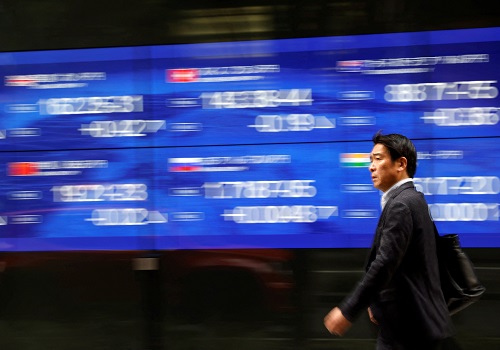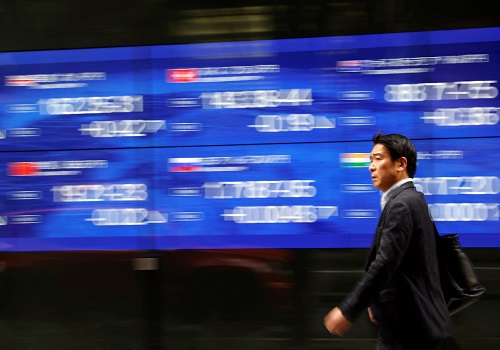
Asian stocks climbed on Monday, buoyed by record high closes on Wall Street, while the dollar bounced back from multiweek lows against the yen and British pound in a crucial week for the U.S. interest rate outlook.
Chinese shares got an additional boost from a robust reading in a private manufacturing survey on Monday, confirming strength in the official data on manufacturing from the weekend.
Incoming U.S. President Donald Trump provided the dollar support by warning the BRICS emerging nations against trying to replace the greenback with any other currency.
"There'll be two drivers of market volatility this month. The first remains the impact of Trump, especially future fiscal settings and, increasingly, looming trade wars," said Kyle Rodda, senior financial markets analyst at Capital.com.
"The second is what the U.S. Federal Reserve does with policy this month," Rodda said. "If the Fed delivers (a cut) and provides sufficiently dovish guidance, it may green light some sort of 'Santa Rally'."
The euro was heavy due to the risk of an imminent collapse of the French government, with Prime Minister Michel Barnier confronted with a Monday deadline to make more budget concessions or face a no confidence vote.
Hong Kong's Hang Seng gained 0.9%, and mainland Chinese blue chips added 0.6% as of 0153 GMT.
The Caixin/S&P Global manufacturing PMI rose to 51.5 in November from 50.3 the previous month, the highest since June and beating analysts' forecasts of 50.5 in a Reuters poll.
The reading largely echoed an official survey on Saturday, which showed manufacturing activity expanded modestly, suggesting a blitz of stimulus is finally trickling through the world's second-largest economy.
Australia's stock benchmark gained 0.3%, inching back towards last week's record high. South Korea's KOSPI advanced 0.3%.
Japan's Nikkei declined 0.3%, dragged down by a 3.6% drop for heavily weighted Fast Retailing, owner of the Uniqlo brand. The broader Topix index, by contrast, climbed 0.4%.
Japanese government bond yields climbed to a 16-year high after Bank of Japan Governor Kazuo Ueda said in an interview published at the weekend that another rate hike is "approaching in the sense that economic data are on track."
Market-implied odds of a quarter-point increase this month stood at around 64%.
The yield on two-year JGBs jumped 3 basis points to 0.625%, the highest since November of 2008.
However, Ueda also told the Nikkei that the central bank wants to scrutinise developments in the U.S. economy as there was a "big question mark" on its outlook, such as the fallout from Trump's proposed tariff hikes.
The dollar index, which measures the currency against six major rivals, rose 0.2% to 106.23.
The dollar climbed 0.5% to 150.53 yen, bouncing back from Friday's low of 149.47 yen, a level last seen on Oct. 21.
Sterling slid 0.4% to $1.2690, after touching $1.2750 on Friday for the first time since Nov. 13.
The euro sank 0.4% to $1.0530. On Friday, it reached the highest since Nov. 20 at $1.0597.
France's far-right National Rally lawmaker Marine Le Pen said on Sunday that Barnier has until Monday to make further budget concessions to avoid a no confidence motion that would trigger the government's collapse.
Meanwhile, the outlook for monetary policy provided another weight on the single currency.
The European Central Bank is seen cutting rates this month, with markets implying a 27% chance it might even ease by 50 basis points on Dec. 12.
The Federal Reserve is also in focus, with Friday's monthly payrolls report set to inform central bank thinking about whether to cut rates again on Dec. 18.
A number of Fed officials are due to speak this week, including Fed Chair Jerome Powell on Wednesday. Traders currently put the odds of a quarter-point reduction at about 66%.
In a holiday-shortened session on Friday, the S&P 500 and Nasdaq added 0.6% and 0.8% respectively to close at all-time highs. S&P 500 futures pointed to a slightly lower reopen for Monday.
In cryptocurrencies, ether rose towards Sunday's nearly six month peak at $3,748, last trading 3.7% higher at $3,726.
Bitcoin edged up to $97,863, inching back towards the record high from Nov. 22 at $99,830.
Gold sank 0.7% to $2,635.50 under pressure from the strong dollar.
Oil prices edged up, supported by the Chinese manufacturing data, and as Israel resumed attacks on Lebanon despite a ceasefire agreement.
Brent crude futures climbed 11 cents to $71.95 a barrel, while U.S. West Texas Intermediate crude was at $68.14 a barrel, up 14 cents.
